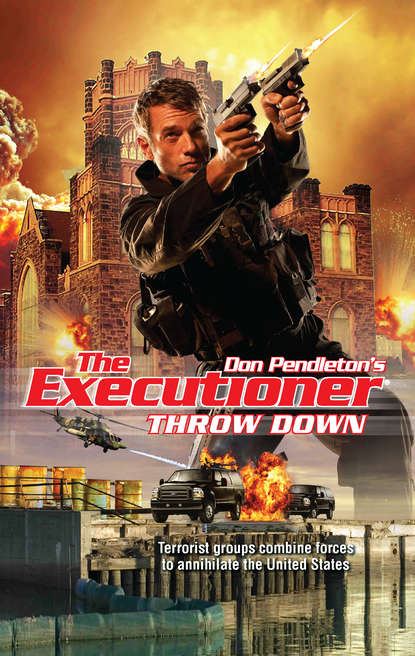По всем вопросам обращайтесь на: info@litportal.ru
(©) 2003-2024.
✖
Throw Down
Автор
Год написания книги
2019
Настройки чтения
Размер шрифта
Высота строк
Поля
“How am I supposed to know which side you’re really on?”
A long and uneasy silence filled the room. It was clear that Ahmad knew as well as Bolan did that it was impossible to be certain of where his true loyalties lay. Finally, the little man cleared his throat and said, “All I can do is tell you that I believe Jesus, born to a virgin, was God on earth,” he said. “But he was also a man—a man who resisted all temptation from Satan and lived a sinless life. I believe he was crucified to pay for the sins of all who accept him, and that on the third day he arose from the dead.”
Bolan continued to stare at the man. He knew no more than he had before Ahmad’s last speech. The little Hezbollah man could have read the New Testament, just as Bolan and O’Melton had read the Koran, and learned exactly what he was supposed to say if he was pretending to be a Christian.
It could all be a ruse. And only time, and Ahmad’s actions in the operation they were about to undertake, would prove he was telling the truth or lying.
“Okay,” Bolan said. “Assuming you’re on the level, what can you tell me about upcoming Hezbollah activities?”
Ahmad seemed to shrink even smaller in his chair and his eyes flittered around the room once more, as if he was afraid someone besides Bolan and the priest might hear. When he spoke, it was in a whisper. “Ever since the death of Osama bin Laden, all Islamic jihad organizations have been aching to hit the U.S. with a strike that exceeds the World Trade Center and Pentagon attacks.”
“Has Hezbollah united with al Qaeda?” Bolan asked.
“No,” Ahmad said. “There are too many philosophical differences between the two groups.” He paused, then took in a deep breath. “The fact is, the two hate each other.”
“They just hate America more,” Father O’Melton interjected.
“‘The enemy of my enemy is my friend,’” Bolan quoted.
“Precisely,” Ahmad said. “But as far as I know, there are no joint operations currently being planned.”
“So just tell us what you do know,” Bolan said.
“I cannot tell you the details of any small future strikes such as the chapel,” he said. “We were never given details until the last minute. But I do have information that I believe will help America, and Christians and Jews throughout the world.” When he drew in a breath this time, the long shaggy tails of his mustache were sucked into his mouth along with the air. Carefully, he pulled them back out with a thumb and forefinger. “There are things being planned that are far bigger and more destructive than the attack on the chapel. Things that will make the World Trade Center and Pentagon attacks pale in comparison.”
“Give them to me in a sentence or two,” Bolan said. “Then I want you to go down to the barbershop in the lobby. I want your hair cropped short and your beard gone.” He stood up and stretched his back. “If you’re going to be running with us, you need to look like us. And while all the Hezbollah men in your cell are now dead, there’s always a chance we’ll run into some other terrorist who recognizes you.”
Ahmad just nodded.
“So tell me what you know,” Bolan said.
“I know that Saddam Hussein did have weapons of mass destruction,” the little man on the desk chair said. “But he had time to ship them out of Iraq to sympathetic and allied countries before the United States invaded.”
For a moment, the Executioner was struck silent. He had expected Intel, but nothing this big. “Do you know what they were and where they went?” he asked.
“There were large stores of chemical and biological weapons, and one medium-range rocket with a nuclear warhead.”
“Tell me,” Bolan said, with a trace of suspicion in his voice. “How does a Hezbollah soldier such as yourself come by such ‘inside’ information?”
Ahmad shrugged. “For many years now, Hezbollah has transported both weaponry—rifles, ammunition and the like—as well as documents from Iraq to Syria and back. We did not always know what we were delivering. It is one of the duties we perform in return for the protection both countries provide for us.” He stopped speaking for a moment, then said. “Allow me to rephrase that last part. My English is not always so good, and I should have spoken in the past tense. These jobs are done in exchange for the protection both countries provide for my former comrades in Hezbollah. In any case, as you might guess with any peoples, rumors abound under such conditions. I cannot be certain, but I suspect Syria took possession of large quantities of biological or chemical agents. My reasoning for this is that only a few days before the U.S. invaded Iraq, we drove the largest and longest convoy of supply trucks we had ever taken from Iraq to Damascus.”
Вы ознакомились с фрагментом книги.
Приобретайте полный текст книги у нашего партнера:
Приобретайте полный текст книги у нашего партнера:











